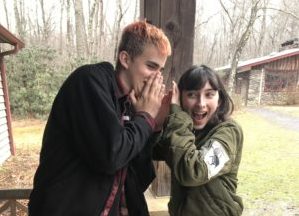Rebel with a Cause: Supporting Students’ Need to Break Rules

Teenage rebellion is normal and healthy. However, it sure is challenging for the adults in their lives. As Understanding Teenagers explains, adolescents rebel as part of the identity formation stage in brain development. This phase of growing up is a trying time for teenagers and their parents. Young people try to assert their independence, so they often push away parents and get into trouble. Much of this stems from a desire to separate oneself from childhood dependencies. A helpful resource is Psychology Today’s article Rebellion in Adolescence. This piece explains that there are ways to navigate adolescent rebellion that generate success for parents and children. At The Arthur Morgan School, we understand students will try their hands at rebellion, and because of this, we have structures to ensure these forays into defiance are safe. This is where our traditions of Sneak Outs and Raids come in.
Sneak Outs and Raids Explained
Sure, teenagers sneak out of the house in movies, books, and everywhere else in pop culture. But that is not how it works at AMS. Sneak Outs are staff-sponsored secret activities after dark. For instance, they involve anything from a board game marathon, to a midnight movie party, to a Raid. A Raid is when students sneak into a boarding house in the wee hours of the night and pull a prank. In other words, students often reorganize furniture, put Kool-Aid in shower heads, or other silly hijinks. After that though, students are required to leave a baked treat. Furthermore, the raid cannot take more time to clean up than it required to set up. These guidelines allow students to have fun but not cause too much trouble.
Supporting Healthy Rebellion

Students pretending to be sneaky.
In order to make their wildest Sneak Out dreams come true, students form an itinerary. Staff provide support while the middle schoolers make a plan. Student agency is crucial here. They feel capable as they see their plans come to fruition. This reinforces the identify formation they are already experiencing. Educator and scholar, Barry Zimmerman’s article Adolescents’ Development of Personal Agency explains this. Zimmerman says part of the “pivotal transition from adolescence to adulthood” necessitates adolescents discovering and maintaining “self-sufficiency.” Through planning a Sneak Out or a Raid, students accomplish this! Furthermore, if anyone who was not invited on the Sneak Out or Raid discovers them, the event is cancelled! This creates a culture of inclusivity. In other words, students bragging to others who will not be involved is not tolerated.
Effects on the School’s Culture
Sneak Outs provide students with a healthy dose of simulated disobedience. Silas, a seventh grader, describes it with, “It feels exciting to do something you normally couldn’t. It makes it more fun.” This keeps students from looking for other forms of rebellion. Or, as Ian, a ninth grade student says, “the day after a sneak out you are always tired.” In conclusion, students are able to meet their need to defy order and disobey. Above all, students are able to rebel in a way that helps them succeed instead of hindering growth.
-Annie Livingston
